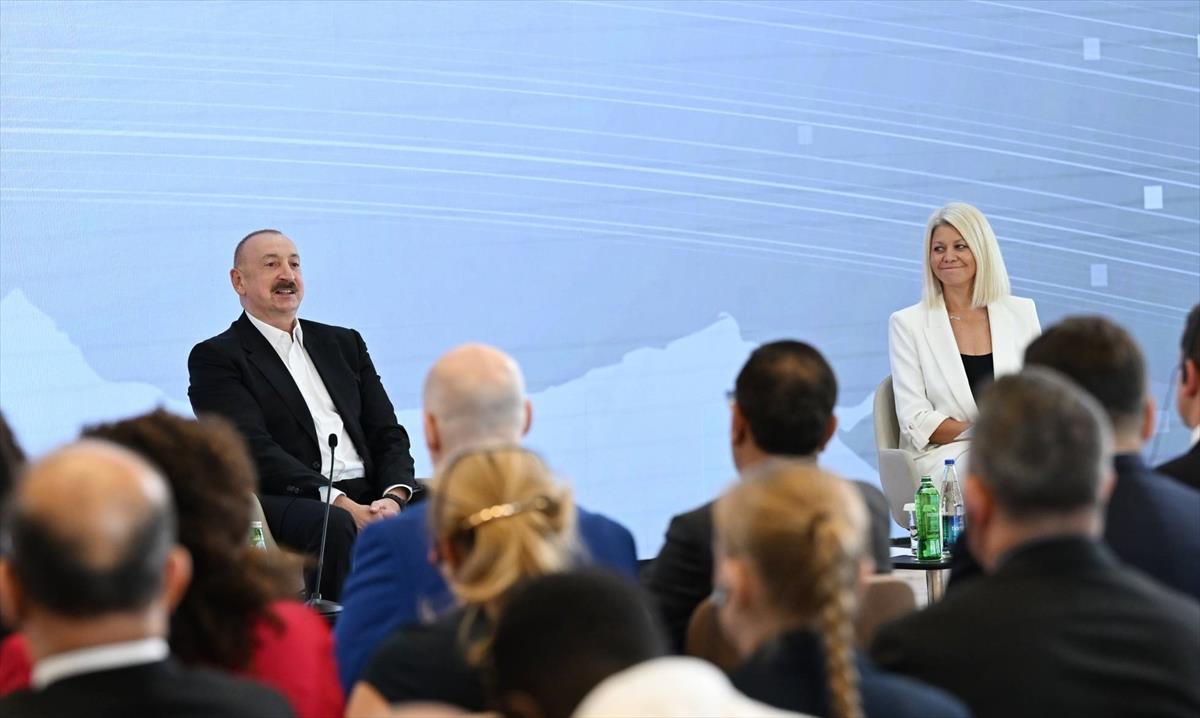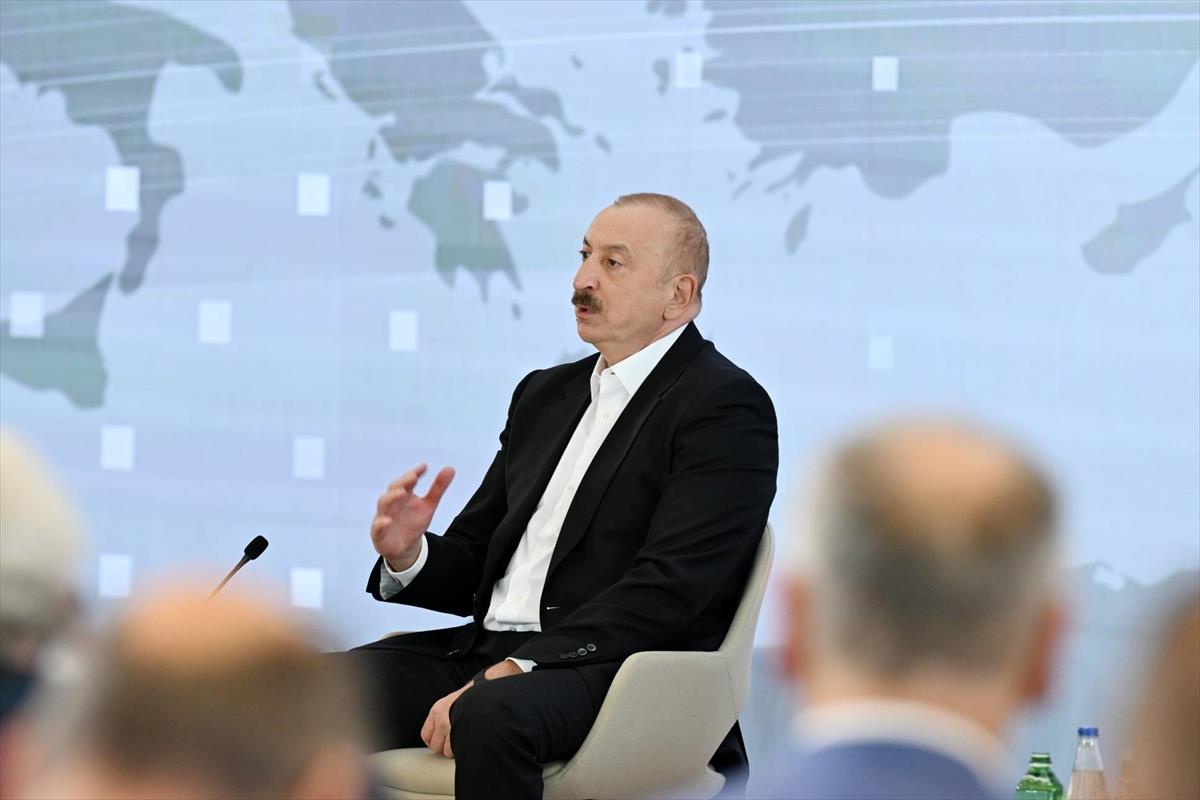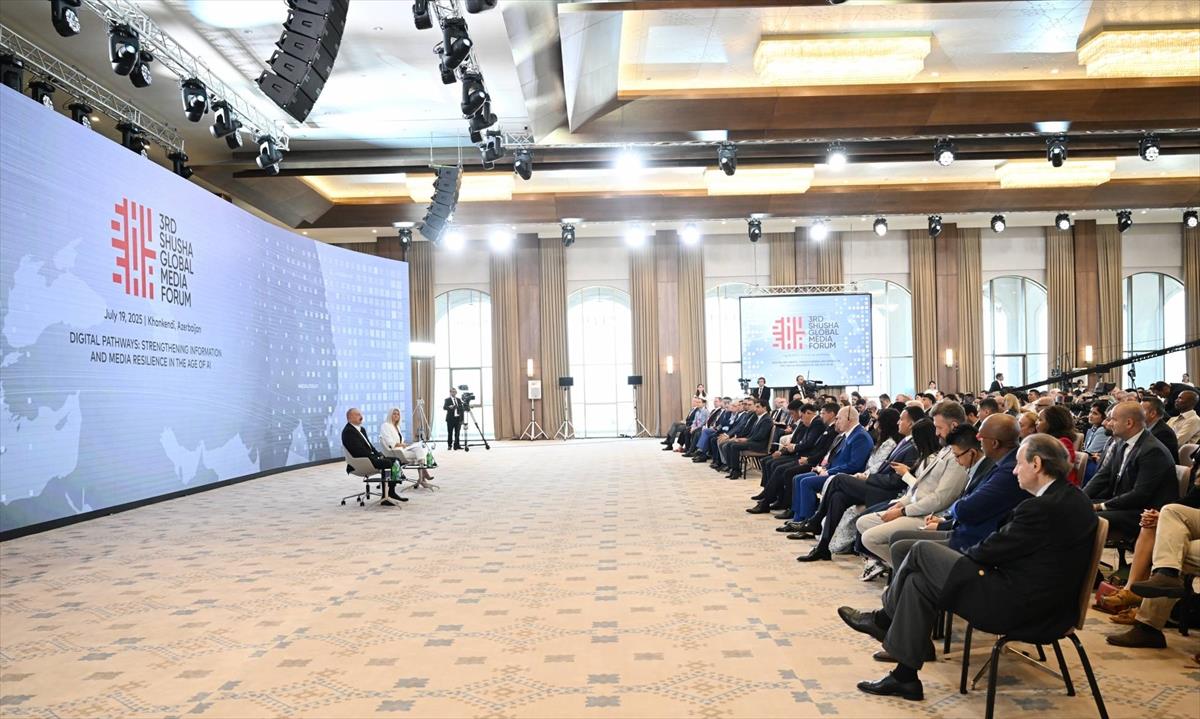“Never give up” – Aliyev sends a message to Ukraine and delivers a blow to Moscow

Azerbaijani President Ilham Aliyev delivered a high-profile speech at the 3rd Shusha Global Media Forum on 19 July, responding to numerous questions from journalists. Daily News Hungary was present at the event. The forum’s symbolic location—in the heart of Nagorno-Karabakh—underscored Azerbaijan’s shifting geopolitical position.
Post-Karabakh rebirth: return, reconstruction, and transit hubs
More than 50,000 residents have returned to Karabakh since the war, with billions of dollars invested in rebuilding the region. Roads, railways, neighbourhoods, schools, hospitals, churches, and mosques are under continuous construction. “What we see in Karabakh now is already a paradise—and this is just the beginning,” the president said.
He noted the emergence of both digital and physical transport corridors between Iran, Azerbaijan, Georgia, and Türkiye, as well as “new maritime and land shipping routes” connecting Uzbekistan, China, and Europe—including Hungary. With the Zangezur Corridor and other rail projects, Azerbaijan is becoming a regional logistics hub.
COP29 and the green energy future
Aliyev called hosting the COP29 climate summit in Baku a “historic breakthrough that allowed Azerbaijan to make a global impact.” Delegates from nearly 200 countries participated in the conference.
Azerbaijan aims to generate at least 6 gigawatts of renewable energy by 2030. Alongside natural gas, solar panels and hydrogen will play key roles. Aliyev emphasised the country’s commitment to aiding the EU, with plans already in place to deliver green energy to Hungary via Georgia, the Black Sea, and Romania.
He called Hungary a reliable partner in the green energy sector. Through the Black Sea transmission project, electricity generated in Azerbaijan could reach Western Europe via Romania and Hungary. Gas exports are also set to increase, but, as Aliyev stated: “We have never viewed gas as a political weapon. For us, it has always been a commercial matter.”
His remarks suggested renewed momentum in relations with the EU. “After past tensions, we are now receiving positive signals from the new European Commission,” he added.



Global power balance: China, U.S., and diplomacy
Foreign policy also featured prominently. Relations with China are at an all-time high and built on mutual trust. In addition to relaxed visa policies, Chinese companies are partnering on Azerbaijani solar and wind energy projects, with joint efforts under way in green energy production.
Regarding the United States, Aliyev said that friendly ties with the Trump administration had been restored, whereas under Biden, “American leadership has turned its back on Azerbaijan.” He remained optimistic: “We’re now returning to normal relations and are ready to elevate cooperation to a higher level.”
He further emphasised: “Azerbaijan has always supported China’s territorial integrity, including Taiwan.”
Strained relations with Russia: “We will not forget”
One of Aliyev’s strongest statements addressed tensions with Russia. He criticised Moscow for failing to clarify the investigation of a downed passenger jet, asserting, “They know exactly what happened.” (On 25 December 2024, Azerbaijan Airlines flight 8243/8432, an Embraer 190 en route from Baku to Grozny, crashed near Aktau, Kazakhstan. Of the 67 passengers, 38 died and 29 were injured. Multiple investigations concluded the plane was downed by a Russian Pantsir-S air defence missile. Russia has yet to accept responsibility and claims its investigation is ongoing.)
Aliyev described Russia’s behaviour as “counterproductive and stalling,” stating it harms bilateral ties. He underscored:
“We will not forget. If someone avoids the truth, we cannot build a long-term partnership with them.”
In a surprise move, Aliyev announced that Azerbaijan had informed Russia it would take the matter to international courts and would patiently await a fair judgment.
Media and information sovereignty
Aliyev criticised what he described as distorted coverage by Western media, which he claimed is under Armenian influence. “Our media does more than defend—when needed, it attacks. That’s necessary. Honest, patriotic journalism is the best answer to disinformation,” he stated.
He praised Azerbaijan’s 150-year press history, which he said “now shapes the international narrative.”
He praised Azerbaijan’s 150-year press history, which he said “now shapes the international narrative.”

Aliyev’s message to Ukraine: “Never give up!”
Aliyev praised the Ukrainian people’s resilience and drew a clear parallel bAliyev praised the resilience of the Ukrainian people and drew a clear parallel between the two nations’ struggles for freedom.
“We didn’t give up either. We never accepted the occupation, and we ultimately regained our lands. Our victory was a just victory. My advice to Ukrainians: never give up,” he said.
He added that Azerbaijan had negotiated for over 15 years before opting for military action. “There were endless meetings and promises, but nothing changed. That’s when we decided to take things into our own hands,” he said, referring to the 2020 war and the September 2023 operation.
“I was president for 17 years before we liberated those territories. Had the chance not come, I might have waited another 17. It’s not about one person or ambition. It’s about responsibility—towards those who came before us, and those who will live after us,”
he concluded.
Summary
President Ilham Aliyev’s speech delivered a clear global message: Azerbaijan has not only survived crises but entered a new era—militarily, economically, and diplomatically. He sent a strong signal to Russia over the plane incident and voiced unambiguous views on Moscow’s occupation actions.
Hungary’s position with Azerbaijan is complex. Though linked by a strategic partnership—a major milestone—Aliyev and Prime Minister Viktor Orbán see the Ukraine situation very differently. The Azerbaijani president stressed resistance against occupiers and the importance of never surrendering lost lands, while Orbán has sided with Russia, favouring any peace over fighting for Ukraine’s cause.
Despite these differences, both governments manage to compartmentalise their disagreements, particularly with extensive cooperation emerging in energy. The Green Energy Corridor project will deliver clean, renewable power from Georgia (hydropower) and Azerbaijan (wind energy), via undersea cables beneath the Black Sea, stretching 1,195 kilometres. Alongside electricity cables, a massive fibre-optic cable will support data services.
Hungary and Azerbaijan are also connected in many other sectors, with the Organisation of Turkic States paving the way for even deeper collaboration in the future.
To read or share this article in Hungarian, click here: Helló Magyar







